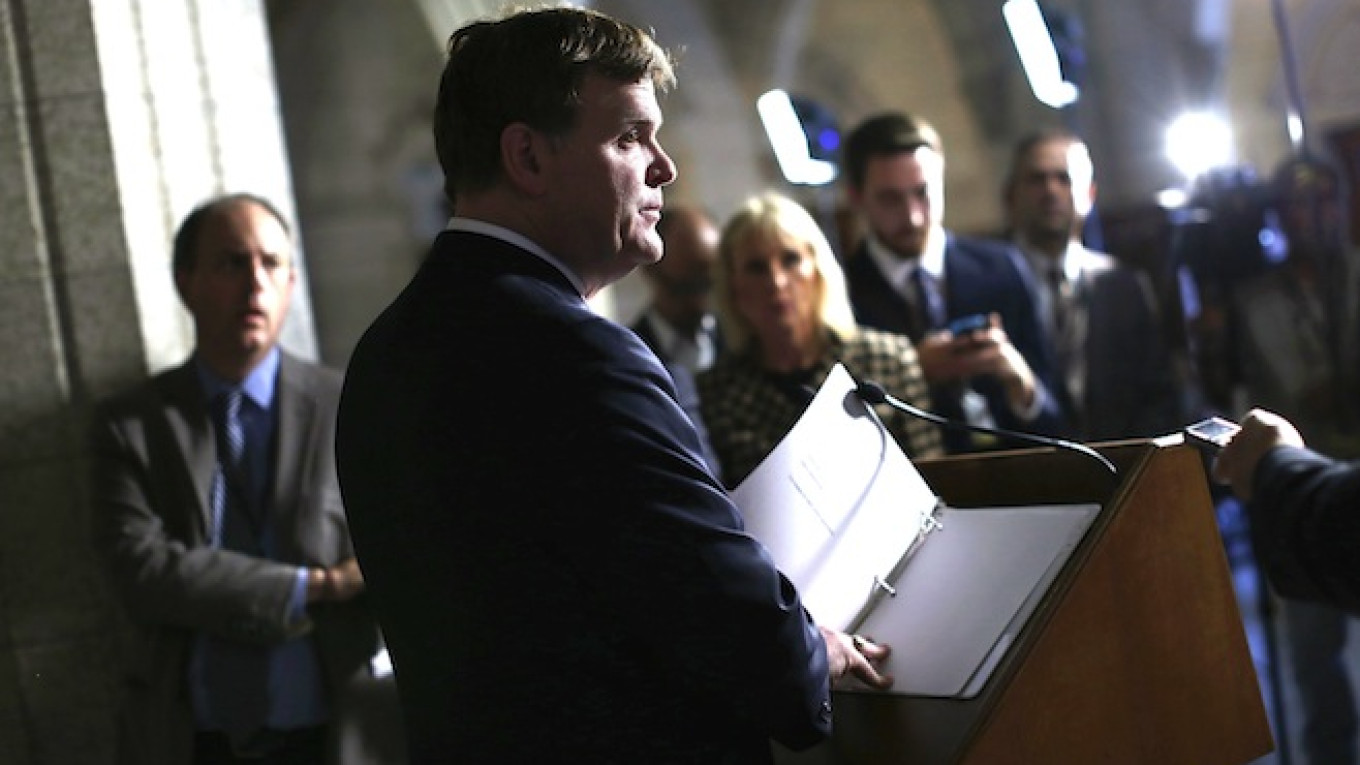Canada, one of the harshest critics of Russia's involvement in Ukraine, this week quietly canceled sanctions against Expobank and RosEnergoBank, two small Russian banks on which it imposed the measures earlier this year.
The cancelations were put into effect at the same time as new sanctions were announced by Foreign Affairs Minister John Baird on Tuesday, including adding Russia's Sberbank to the list, but his news release made no mention of lifting the measures against Expobank and RosEnergoBank.
Expobank ranks as about the 100th biggest Russian bank by assets. RosEnergoBank had income of $4.24 million in 2012 and assets of $1.01 billion, according to Moody's Investors Service.
Quizzed about it in the House of Commons on Thursday after the news was reported, Baird said the decision was made after the government got new information and undertook further analysis.
"They are deemed to be sufficiently divorced from events in Ukraine and Russian aggression against Ukraine," he said, without explaining how they got on the list in the first place.
The lifting of the sanctions was mentioned obliquely in amendments to the Russian "Special Economics Measures (Russia) Regulations" on the Canadian Foreign Affairs Department website, referring only to the repealing of "Items 2 and 3" on a particular part of the list.
Expobank had always disputed its inclusion on the sanctions list and had appealed to be taken off.
"We were sure that the inclusion of Expobank on this list was a misunderstanding and a mistake. We are glad that this issue has been resolved successfully and quickly and that this issue has been removed from the agenda," Kirill Nifontov, chief executive officer of Expobank, said in a statement.
McCarthy Tetrault lawyer John Boscariol challenged the listing with government on behalf of the bank.
"Our position was ... there is no connection between Expobank and (Russian President Vladimir) Putin, or the current activities that Russia is engaged in in Ukraine, and on that basis it should be removed," Boscariol said.
The whole episode drew harsh criticism from opposition New Democratic Party legislator Paul Dewar. "It's not very smart to put sanctions on, then remove them and say 'Whoops, we messed up,'" he told reporters. "It boggles the mind as to what happened here."
In the House, he noted Canada was still shielding "Russian tycoons who have close ties to President Putin, who also have business interests here in Canada."
In contrast to the United States, Canada did not impose sanctions on Sergei Chemezov, who heads state-owned industrial and defense conglomerate Rostec, and Igor Sechin, CEO of oil company Rosneft. Both men, close to Putin, have business ties to Canada.
Baird told Dewar that Canada has 189 different sanctions on Russian individuals and entities, compared with 107 imposed by the United States and 106 by the European Union.
A Message from The Moscow Times:
Dear readers,
We are facing unprecedented challenges. Russia's Prosecutor General's Office has designated The Moscow Times as an "undesirable" organization, criminalizing our work and putting our staff at risk of prosecution. This follows our earlier unjust labeling as a "foreign agent."
These actions are direct attempts to silence independent journalism in Russia. The authorities claim our work "discredits the decisions of the Russian leadership." We see things differently: we strive to provide accurate, unbiased reporting on Russia.
We, the journalists of The Moscow Times, refuse to be silenced. But to continue our work, we need your help.
Your support, no matter how small, makes a world of difference. If you can, please support us monthly starting from just $2. It's quick to set up, and every contribution makes a significant impact.
By supporting The Moscow Times, you're defending open, independent journalism in the face of repression. Thank you for standing with us.
Remind me later.


